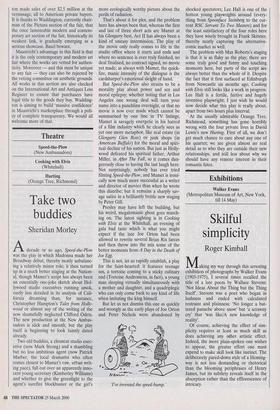Theatre
Speed-the-Plow (New Ambassadors) Cooking with Elvis (Whitehall) Hurting (Orange Tree, Richmond)
Take two buddies
Sheridan Morley
Adecade or so ago, Speed-the-Plow was the play in which Madonna made her Broadway debut, thereby neatly unbalanc- ing a relatively minor role; it then turned up in a much better staging at the Nation- al, though Mamet's script has always been an essentially one-joke sketch about Hol- lywood studio executives running amok, vastly less detailed in its analysis of Cali- fornia dreaming than, for instance, Christopher Hampton's Tales from Holly- wood or almost any of the writing of the now shamefully neglected Clifford Odets. The new production at the New Ambas- sadors is slick and smooth, but the play itself is beginning to look faintly dated already.
Two old buddies, a cleancut studio exec- utive (now Mark Strong) and a shambling but no less ambitious agent (now Patrick Marber, the local dramatist who often comes closest to Mamet's raw, urban writ- ing pace), fall out over an apparently inno- cent young secretary (Kimberley Williams) and whether to give the greenlight to the agent's surefire blockbuster or the girl's more ecologically worthy picture about the perils of radiation.
That's about it for plot, and the problem here has always been that, whereas the first and last of three short acts are Mamet at his Glengarry best, Act II has always been a kind of uneasy intermission. The play of the movie only really comes to life in the studio office where it starts and ends and where no sentence is ever truly finished, no deal finalised, no contract signed, no movie yet made; as always with Mamet, the quick- fire, manic intensity of the dialogue is the cardsharper's emotional sleight of hand.
But Speed-the-Plow also strains to be a morality play about power and sex and moral epilepsy; whether noting that in Los Angeles one wrong deal will turn your name into a punchline overnight, or that no movie is now ever made which cannot be summarised by one line in TV listings, Mamet is savagely energetic in his hatred of a film industry which he clearly sees as yet one more metaphor, like real estate (in Glengany Glen Ross) or junk shops (in American Buffalo) for the moral and spiri- tual decline of his nation. But just as Holly- wood defeated his spiritual father, Arthur Miller, in After The Fall, so it comes dan- gerously close to having the last laugh here. Not surprisingly, nobody has ever tried filming Speed-the-Plow, and Mamet is ironi- cally now much more successful as a writer and director of movies than when he wrote this diatribe; but it remains a sharply sav- age satire in a brilliantly brittle new staging by Peter Gill.
Presley may have left the building, but his weird, megalomanic ghost goes march- ing on. The latest sighting is in Cooking with Elvis at the Whitehall, an evening of gala bad taste which is what you might expect if the late Joe Orton had been allowed to rewrite several Brian Rix farces and then throw into the mix some of the better moments from A Day in the Death of Joe Egg.
This is not, let us rapidly establish, a play for the faint-hearted; it features teenage sex, a tortoise coming to a sticky culinary end (Tortoise Andronicus, in fact), a young man sleeping virtually simultaneously with a mother and daughter, and a quadriplegic who can only come back to any kind of life when imitating the king himself.
But let us not dismiss this one as quickly and wrongly as the early plays of Joe Orton and Peter Nichols were abandoned by I've invented the speed-bump.' shocked spectators; Lee Hall is one of the hottest young playwrights around (every- thing from Spoonface Steinberg to the cur- rent RSC Servant To Two Masters) and for the least satisfactory of the four roles here they have wisely brought in Frank Skinner, thereby neatly capturing the alternative- comic market as well.
The problem with Max Roberts's staging is that it is as flaky as the play; there are some truly good and funny and touching moments here, but parts of the script are always better than the whole of it. Despite the fact that it first surfaced at Edinburgh from Newcastle six months ago, Cooking with Elvis still looks like a work in progress. Lee Hall is a fertile, furtive and hugely inventive playwright; I just wish he would now decide what this play is really about, apart from two hours plus interval.
At the usually admirable Orange Tree, Richmond, something has gone horribly wrong with the four private lives in David Lewis's new Hurting. First of all, we don't get much chance to care about any one of his quartet; we are given almost no real detail as to who they are outside their new relationships, and still less about why we should have any remote interest in their romantic fates.


































































 Previous page
Previous page